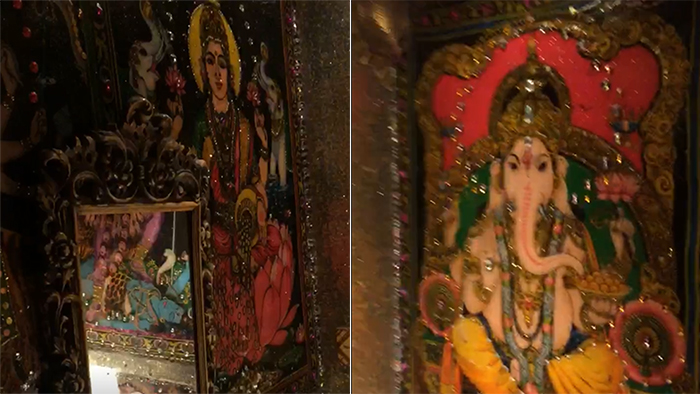- 1.0Kshares
- Share
- Tweet
- Facebook Messenger
Hindu deities and symbols like Aum have often been used by the West fallaciously. Whether it is on t-shirts or art or Halloween costumes by celebs, the misrepresentation of Hindu icons and Gods are an often repeated mistake. A mistake that the Westerners are apologetic about, but don’t learn from and continue to commit.
A US-born Indian woman, Ankita Mishra, recently visited a bar in Bushwick, New York with her friends. And to her shock, she stumbled upon the bar’s VIP washroom decorated with images of Hindu Gods and Goddesses.

“… last month, during a night out with friends, I could not stay quiet when I suddenly found myself in a curiously-decorated VIP bathroom inside House of Yes in Bushwick, NY. The walls were papered with bejeweled images of Hindu gods like Ganesha, Saraswati, Kali and Shiva.”
In a blog post that hits the right chords, Mishra went on to narrate her own reaction to seeing the very deities she and her family worshipped on the walls of a loo, and the events that unfolded after.
Mishra, who described the bar as a place she visited often and enjoyed a lot working for as a bartender, had never been privy to the VIP section. But after witnessing what she did that night, she decided to raise her voice and educate the owners of the establishment about the abhorrent mistake they had made.
In a well-crafted letter, Mishra addressed the owners of the bar and pointed out what was so colossally wrong with their bathroom’s design.

She began by pointing how basic habits that every Hindu the world over follows to offer their respect to their deities.
Mishra went on to point out how elements from several South Asian cultures are erroneously juxtaposed with the ignorant West’s concepts of spiritual awakening. A treatment that followers of those religions do not deserve.
She concluded by offering a momentary benefit of doubt to the designers/owners for their ignorance on the subject.
Mishra admitted that while she felt proud to have spoken up, what she in her wildest dreams did not expect was an apology. But then, the unexpected happened.
A partner/creative designer, who had conceptualised and designed the bathroom, wrote back to her. She not only apologised, but also assured Mishra that the bathroom would be redone entirely.

“I hear you loud and clear and the tone-deaf appropriative/offensive bathroom will be dismantled and redesigned ASAP. To be transparent, the soonest I can take it on is right after Halloween. If you insist, we can put paint over it until then.”
Furthermore, she even thanked Mishra for not just being bold but also educative in her letter.
“I read every word of your email (twice) and I wanted to thank you for taking the time, being bold yet informative in your writing and also trusting us in that you would be heard.”
Ankita Mishra is now exploring her newfound voice, and using it to think in depth about what inspired her to speak up. As she points out, growing up in Indian households is all about being submissive and never speaking up against superiors. An extension of this submissiveness is what many Indians who abroad still live under when they deal with whie Americans. Ankita Mishra hopes that as a hybrid product of Indian upbringing in American culture, she can speak up against any misrepresentation of her and her parents’ culture.
- 1.0Kshares
- Share
- Tweet
- Facebook Messenger




